|
|
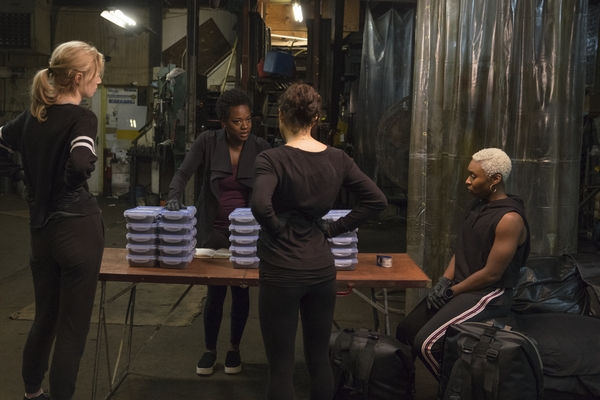 |
| |
|
Widows is set in contemporary Chicago amidst a
time of political and societal turmoil. When four armed robbers
are killed in an explosive heist attempt, their widows – with
nothing in common except a debt left behind by their dead
husbands' criminal activities – take fate into their own hands
to forge a future on their own terms.
Based on the popular U.K. television series of the same name,
created by Lynda La Plante, Widows is directed, co-written and
produced by Academy Award-winning filmmaker Steve McQueen, whose
12 Years a Slave won the 2013 Academy Award for Best Picture.
“I remember seeing Lynda La Plante’s TV show Widows at 13 years
old,” recalls McQueen. That these women achieved something no
one thought they had the capability of doing left a big
impression on me, especially at a time in my life when I was
being judged in the same way. Many years later, when I first
came to Hollywood, I was struck by how many talented actresses
weren’t working. I decided then that after I made a movie about
slavery that I wanted to make a female-driven film.”
|
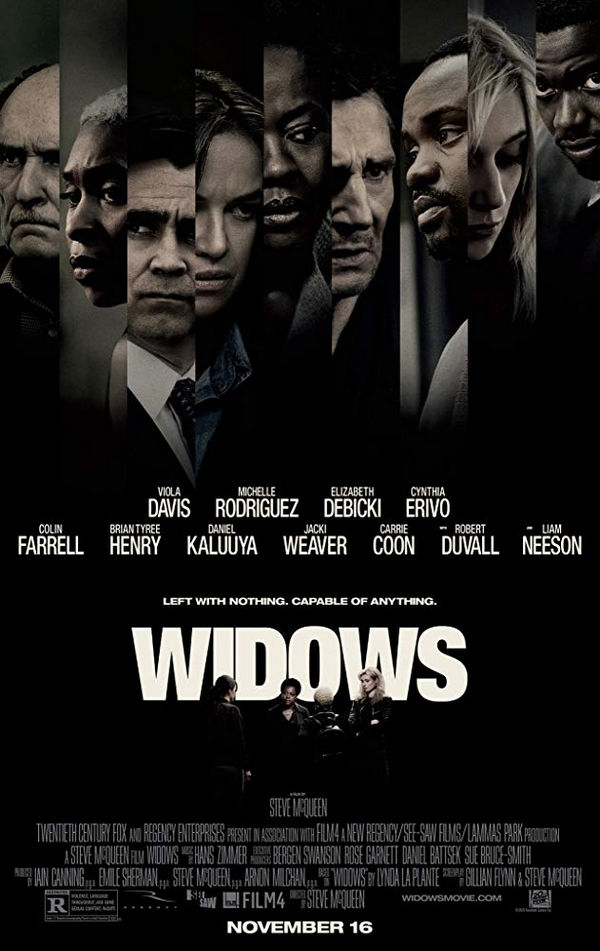 |
|
|
Poster
|
|
When McQueen approached renowned screenwriter Gillian Flynn (Gone
Girl) to co-write the script, she says she jumped at the
opportunity. “Steve McQueen called me, which was a great phone
call to get out of the blue,” she recalls. “He knew I lived in
Chicago, and he wanted to do a heist film starring four women,
so I’m already in. Then it’s going to be shot in the town I live
in and love, Chicago, which is such an underused town and such a
cool town. And he wanted to use all the neighborhoods and really
employ the city as its own character. And you just don’t see
Chicago enough, the real Chicago in film. So, I was immediately,
like, ‘Where do I sign up?’”
According to Flynn, the story offers a twist on the typical
heist film in that each character that intersects comes from
different ethnic, financial and social background. “My favorite
part about heist films are when the team comes together. I love
that,” she notes. “That’s one thing I wanted to keep about that
heist feel, was that these women were coming together, not
because one was a jewel thief, and one was a safe cracker, that
type of thing, but because they just happen to all be connected
by their husbands. “
Producer Iain Canning was approached by McQueen early on about
the project. “He’d grown up watching the show and it was
powerful for him when it was on television, this story about
this group of women, which was very rare,” Canning says, “and it
just sounded like an interesting, new area for Steve to move
into. He’s made these incredible films about incredible subjects
and it just felt like it was a good moment to tell the story
about this group of ordinary women in extraordinary
circumstances who have to fight for their survival.”
The filmmakers assembled an impressive cast of actors for the
film. McQueen says it was very important to make his cast feel
comfortable and at-home, so to speak. “It’s very simple: they’re
all great actors and you need to create an environment in which
they feel safe to experiment and explore. That’s what I hope I
provide actors, a safe space to fall on their faces, brush
themselves off and try again in search of some kind of truth.”
|
|
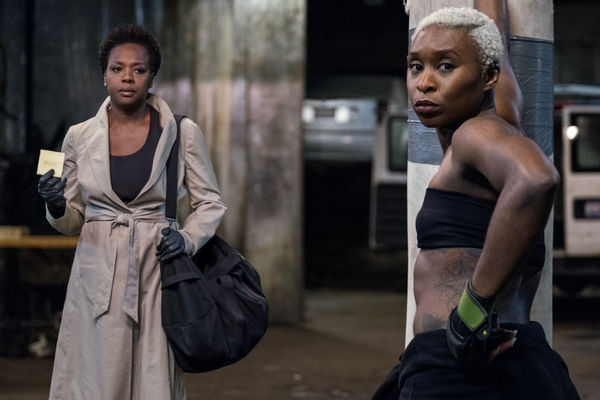 |
| |
|
Academy Award-winning actress Viola Davis was cast as Veronica
Rawlins, the lead widow of the film who must pick up the pieces
of her life after her husband, Harry (played by Neeson), dies in
a failed heist.
Davis says it’s a role that she never imagined she’d be asked to
portray. “It’s a huge departure for me,” she exclaims. “I
wouldn’t imagine myself being in this. First there’s a nice love
scene in there. It’s kind of action-packed. I don’t know, I just
didn’t see it. So, Steve McQueen literally coming to me and
saying, “I do see you in this role,” was sort of exhilarating to
me.”
Once getting over the pleasant surprise of being approached for
the role, Davis says she found herself drawn to her character as
well as to the story. “I liked Veronica’s journey,” she relates.
“I liked that she was sort of mysterious, but at the same time
she was familiar to me. I liked the fact that there’s a love
story at the center of it. I like me in a love story, because,
you know, I played a lot of lawyers and detectives and CIA
directors, people like that. It’s a hell of a love story.”
In the film, Veronica is married to career criminal Harry
Rawlins, played by Liam Neeson. When you first meet them, the
couple have already been damaged by a tragic death. “They very
much are bonded by grief,” she notes. “And then Harry dies in a
heist accident… and she’s left with nothing, literally nothing.
Nothing in terms of finances and nothing in terms of even
emotional reserve. But she decides to live.”
She decides to live by finishing the heist Harry was supposed to
commit. Step one: employ her crew, the widows of Harry’s cohorts
in crime. “It just starts off with all of us being strangers,”
Davis explains. “But the one familiar element is that all of our
men died in this fire, and they were all thieves. That’s the
only thing that binds us together. And, also the fact that we’re
all broke and we need to survive now. We’re in survival mode.
But other than that, we couldn’t be any more diametrically
opposed.”
|
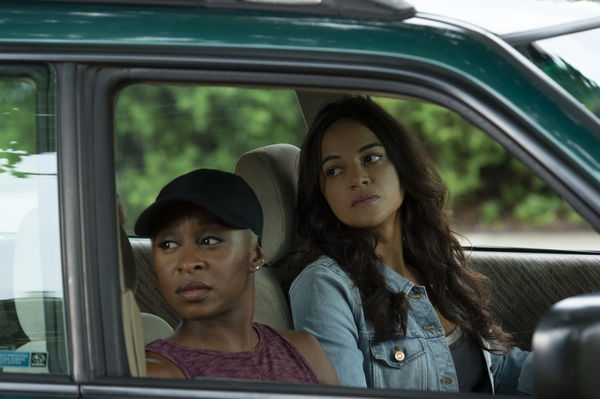 |
|
|
|
|
Davis notes that her chemistry with Neeson was natural,
especially in the ‘bed’ scenes. “I felt like he was familiar to
me,” she observes. “It was nice and I’m thinking to myself, ‘I’m
in bed’, and the racial implications of it. And, I mention this
and I know people can roll their eyes, but something needs to be
said about it, really. Because at what point in the history of
cinema, have you seen someone who looks like me and someone who
looks like Liam Neeson in bed together, kissing, romantic, in
love, married?”
Michelle Rodriguez plays Linda, a widow struggling to keep her
family and dress shop afloat after her husband’s death.
Rodriguez admits she was afraid to take on the role at first. “I
think it was the challenge of considering the woman that I’m
playing weak; my fear of that, of projecting a character like
that to the world,” she recalls. “I’ve always been all about
making women as independent as I possibly could, especially the
image of a Latina woman, who faces the machismo of our culture.
That’s my go-to thing.”
Ultimately, it was her decision to face her fears of the unknown
that made up her mind. “I sat down with Steve and he’s just such
an artist,” she recalls. “So, I was like, ‘Okay, I’ve been doing
this for fifteen years. And I’m very comfortable in my little
niche of making action movies. But I’m not going to evolve here.
There’s no room to grow.’”
Rodriguez describes her character as being naïve and trusting
when we first meet her. “Linda got pregnant young in life and
married her high school sweetheart, and was a mother very young.
So, she didn’t really have much of an opportunity to decide,
really, what she was going to do with her life. I mean, her
greatest manifestation was the story you see here,” Rodriguez
notes. “She’s a woman who’s loyal and loves her man and loves
her family.”
Elizabeth Debicki, cast as Alice – the Polish immigrant and
controlled wife – says she wanted to be part of the film in
order to work with McQueen. “Steve has an incredible warmth and
generosity and sensitivity to him and he's also very exacting
and instinctive in a fascinating way. He is rigorously in
pursuit of truth in its rawest form. As an actor I am always
looking for someone who is going to ask that of me. Steve did
while creating an environment that is collaborative and
empowering and safe. There is huge freedom in that trust.
Working with him is incredibly liberating.
|
|
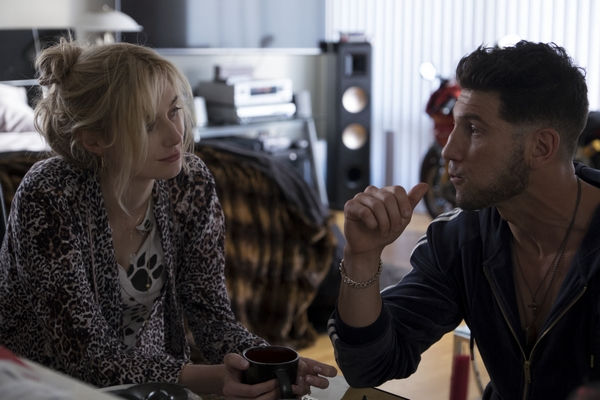 |
| |
|
Debicki describes her character, married to Florek (played by
Jon Bernthal), as the least savvy, most sheltered of the widows.
“When we meet Alice her world is very small and repressive.
She's gone from living with her mother in a controlled
environment where she's her mother's doll, to being dominated
and controlled by her husband. She is very submissive, she can’t
conceive of life being otherwise because she has internalized
what others have told her about herself, that she is worthless
and that she needs them in order to survive. She’s told she
cannot be independent emotionally, financially, socially and she
believes this," she explains, “when I think of Alice's journey,
it's such a huge arc for her through the course of the story.
She goes from being someone who has accepted what the world
tells her she is – a daughter and then she's a wife, Something
to be seen and not heard, a woman who mustn’t ask for what she
wants or needs – to a woman taking control of her life.”
Debicki observes that the process of joining up with the other
widows and taking part in the heist develops her sense of
self-worth and self-esteem.
Cynthia Erivo, in her first major film role, portrays Belle, an
ally who steps in to help the widows in their quest. “I just
think it's a massive vote of confidence for Steve to put someone
who's really new at film in a role like this,” Erivo says of
McQueen’s decision to cast her. “It’s not small, it's a
wonderful role to be a part of, and he trusted me in it.”
Erivo loves that her character is strong and complex. “She’s
very straightforward. I want to even say stoic at times. She's
from the South Side so she's no stranger to the danger that
happens around her area,” she notes. “She's a single mother, and
she's a hairdresser but she's got smarts about her and she has
almost no fear. She just knows what needs to be done in order to
survive. That's where she comes from, so when she meets these
women, it isn't a second thought that she's able to help.”
A politician who figures into the widows’ master plan is Jack
Mulligan, played by Colin Farrell. Farrell admits he feels a bit
sorry for his character, whose life was already mapped out for
him based on his family lineage.
The son of Tom Mulligan, played by Robert Duvall, Jack is meant
to follow in his father’s footsteps by becoming the next
alderman for the 18th Ward of Chicago. “So, there is obviously
this very distinct lineage that I am supposed to fall in line
with, and Jack Mulligan is supposed to carry his father’s torch,
his father who carried his father’s torch, but it’s not really
what he wants. It’s not really what he’s dreamed of doing,”
Farrell explains.
Not only is Jack dealing with his own personal demons but he is
running against an enigmatic opponent. “There’s a shift in the
power politic that is potentially happening, and the person
who’s running against me is an African-American gentleman from
the 18th Ward, who has a history of criminality in his life,”
Farrell explains. “And he’s choosing to go ‘straight’, but he’s
running against me. And the ward that I’m running to represent
is predominantly African-American, and so it’s not looking good
for my character at all.”
Farrell says he was honored to work with the legendary Duvall.
“He’s extraordinary and just what I’ve seen up close, in person,
the scenes we’ve done, has been incredible. He’s a cultural
cinematic icon and I get to work with him.”
The feelings were mutual, according to Duvall, who found Farrell
to be an exceptional actor. “We are talking and listening, which
is not that easy,” Duvall says of their acting process. “It’s
not that easy necessarily, and especially when it gets to
certain emotional levels, but Colin’s very good at that and I
love to take from other actors when it’s real within an
imaginary set of circumstances.”
Duvall says not only did he relish the opportunity to work with
McQueen, he was attracted to his character and the complicated
love-hate, father-son relationship.
“He’s an elderly guy who’s somewhat ailing physically and still
trying to keep some kind of control,” Duvall explains. “Even
though his son – they hate each other, love-hate - is really
running the show, he’s trying to tell his son we’ve got to keep
this city in our hold, in our grasps. It’s our city. We made it.
We got to keep control and he doesn’t want to hear this, but
it’s that relationship thing that I liked, that I like in any
part that I try to take, and I figure maybe I can do something
different with.”
Brian Tyree Henry, best known for his work in the acclaimed TV
series Atlanta, plays Jamal Manning, Jack’s political opponent
in the 18th Ward and a man to whom, Veronica discovers, Harry
owes money. Henry says he knew he had to be a part of this
‘special project’.
“I definitely was attracted to the story based on the line-up
and the director. But also the writing is unbelievable,” he says.
Henry explains it was the character’s honesty that appealed most
to him. “This is his home,” he adds. “You know, he says that to
Jack. He’s like, ‘You know, your family is on this ward, done
all these things with this ward, but look at it. Like it hasn’t
gotten anywhere. What have you really contributed to us?’”
“I, however, feel like I can bring something to that. And I
think that’s the best thing about Jamal is that he and his
brother, they’re from these streets. They’re from this area.
They really do care about the people there. Now, you know, as
politics go, you kind of got to do what you gotta do to get
where you want to get.”
Henry says that actor Daniel Kaluuya, who plays his brother
Jatemme, truly became like family during the production.
“[Daniel] is one of the most phenomenal people I’ve ever met,”
he says. “And I really do feel like he’s my brother and that
really informed how we could play them.”
Kaluuya, best known for his role in the acclaimed thriller Get
Out, is also Jamal’s protector. “It’s easy to think of Jatemme
as the muscle, as you know, the bully or the henchman that does
what Jamal wants, but I think that Jatemme really wants the best
for his brother and wants to be right there,” Henry explains.
“Whereas Jamal loves him dearly, but I don’t want to say he’s
using him as a pawn, but at the end of the day Jamal is going to
do what he’s got to do to get where he’s going to get. But there
is a true depth to their relationship there, ‘cause it’s just
been us. You know what I mean?”
Kaluuya sees his character as Jamal’s street alter ego. “He’s
Jamal in the streets,” he observes. “You basically see how they
got to where they are, and Jatemme is one of the main reasons
why and how they’ve managed to get the support of the community
and the funding of the community through how Jatemme moves. And
he basically does a lot of things he shouldn’t be doing.”
In addition to helping his brother politically, Jatemme is also
responsible for muscling in on Veronica to collect the money
Harry owes Jamal. “Veronica’s late husband did something very
not nice among brothers,” Kaluuya explains. “And they want some
payback. They’re just not going to let things lie. But it’s in
the middle of a political election, so they have to do things in
a bit more of a discreet way.”
Chicago as its own character
The filmmakers decided early on to use Chicago as the backdrop
for the story. “Chicago has so many levels of interest to me,”
says McQueen. “Political, racial, religion, policing and
criminality and how all of these networks at some point
crossover and have a relationship to each other.”
When production designer Adam Stockhausen first met with
McQueen, they discussed how to work Chicago into the storyline.
Stockhausen recalls the conversation: “How does Chicago relate
to the story of the movie? And how do we tie those two together
visually and thematically and hold onto that in a way that's
legitimate… in a way that doesn't feel like we're taking our
ideas about what the place is, or our ideas about what it should
be and laying it on top of what the city is, rather than trying
to find out what's really here and finding out the truth of the
place.”
According to executive producer Bergen Swanson, McQueen was
adamant about shooting the film on-location in Chicago and not
substituting another city for the real thing.
Even the cast was told to view the city as a major player.
“Chicago is another character”, Davis notes. “I mean, you have
this vibrant city with great restaurants and beautiful
high-rises on Lakeshore Drive, and beautifully manicured lawns
and, God, what a great artistic scene and all of that. But, then
you have the other. You have the Lawndales, the Garfield Parks,
the Inglewoods, you know, the neighborhoods that have a high
crime rate. You have the segregation, and that only happens with
corruption.”
According to Swanson, McQueen never wanted to cheat a location.
“… just as we didn’t cheat Chicago in Atlanta,” he explains.
“For example, a Lawndale apartment is in a different part of the
city. And so we’ve actually changed the story a bit if we
discovered that what was written on the page wasn’t specifically
accurate. “
Location manager Nick Rafferty recalls the scouting process from
the moment Stockhausen landed. “We’d drive neighborhoods,”
Rafferty recalls. “Adam wanted to see the city. He wanted to
understand when you cross lines, how things change and how
neighborhoods change. Ultimately, we wanted to showcase every
part of the city. And each of the characters come from really
diverse backgrounds.”
The Mulligan house is one location that required very particular
characteristics, Rafferty says. The team scouted in Hyde Park in
the Kenwood section of the city, an historic neighborhood in
which former President Obama owns a home. “We were looking for a
place that immediately sold the fact that this alderman was sort
of part of this legacy. He was part of Chicago’s establishment.
He was part of the landed class. A lot of these mansions were
built for Chicago’s capitalists and robber barons, like the
Sears Roebuck family lived here, the Wilson sporting goods
company, they built their home here.”